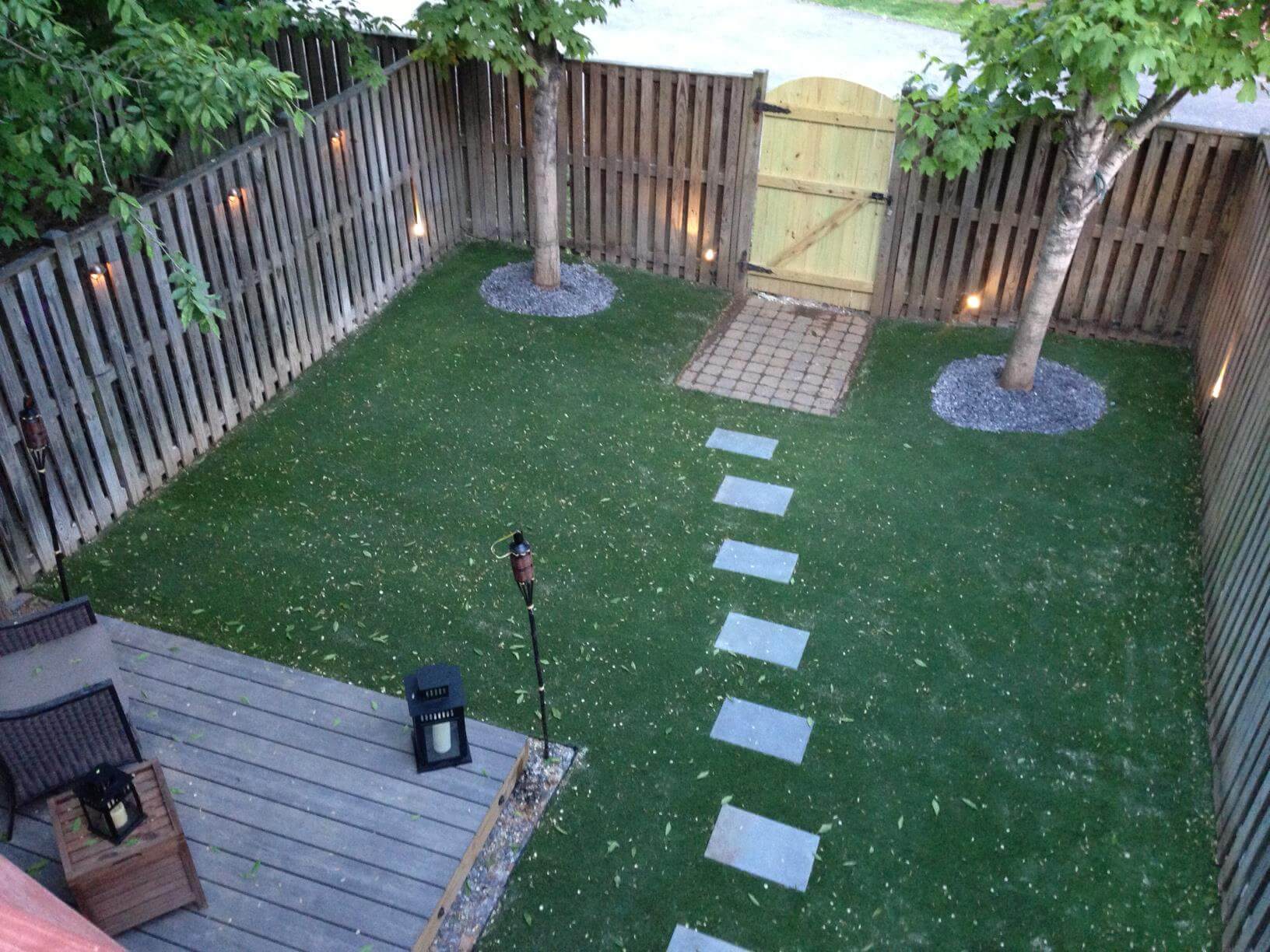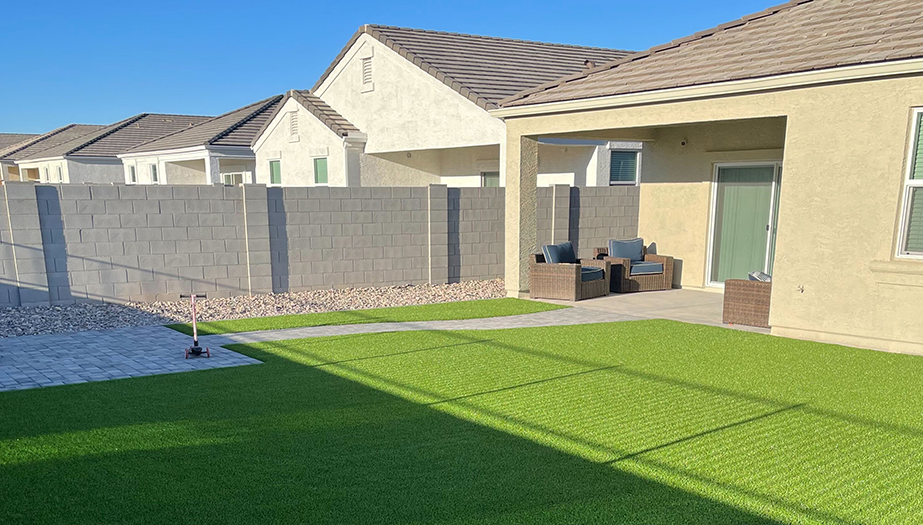Top Reasons to Take Into Consideration Artificial Lawn for a Lavish and Low-Maintenance Backyard
As home owners significantly look for lasting remedies for exterior areas, fabricated yard offers an enticing choice to conventional yards. The benefits prolong beyond mere appearances and sustainability; exploring the multifaceted effects of fabricated yard discloses a comprehensive approach to backyard monitoring that qualities much deeper consideration.
Year-Round Greenery
Among the most considerable advantages of artificial lawn is its capability to provide year-round greenery, despite climate problems. House owners frequently encounter difficulties in preserving a vivid yard due to seasonal modifications, dry spells, or heavy rains. Synthetic yard gets rid of these problems, guaranteeing a constantly lush appearance throughout the year.
This artificial alternative is engineered to stand up to different climate scenarios, from blistering summer warm to freezing wintertime temperature levels. Unlike natural lawn, which might brown or end up being uneven throughout extreme conditions, synthetic grass preserves its lively shade and texture, enhancing the visual allure of any landscape.
In addition, fabricated grass is immune to insects and illness that typically affect natural lawns. This durability adds to its enduring charm, as there is no requirement for chemical therapies or fertilizers that can be dangerous to the setting. Furthermore, house owners can delight in the aesthetic advantages of a well-maintained lawn without the cyclical difficulties positioned by all-natural yard treatment (artificial grass installation).
Minimized Maintenance Efforts
Synthetic lawn substantially minimizes maintenance efforts, permitting property owners to delight in a beautiful lawn without the time-consuming jobs connected with all-natural lawn care. One of one of the most significant benefits of artificial grass is the elimination of regular mowing. Without demand for a lawnmower, home owners conserve both time and the expense of maintenance related to this devices.

Cleaning up man-made lawn is uncomplicated; a straightforward rinse with a hose or the periodic cleaning to get rid of particles is usually enough - artificial grass canoga park. This simplicity of care allows homeowners to spend even more time appreciating their exterior areas instead of laboring over them. In recap, the lowered maintenance efforts connected with synthetic turf make it an appealing selection for those looking for an attractive, convenient lawn
Water Conservation Benefits
The substantial decrease in upkeep efforts connected with fabricated lawn reaches water conservation, making it an ecologically friendly option for home owners. Standard yards require substantial quantities of water to stay lush and vivid, often bring about extreme water usage, especially in deserts. On the other hand, artificial lawn eliminates the demand for regular watering, dramatically minimizing the overall water intake in your yard.
By selecting synthetic turf, property owners can save thousands of gallons of water every year. This shift not just benefits specific households yet also contributes to broader environmental efforts aimed at reducing water waste. In areas experiencing water scarcity, the adoption of synthetic turf can play a look here considerable duty in alleviating the impacts of dry spell and making sure that important water sources are utilized a lot more effectively.
In addition, the installment of fabricated lawn can aid reduced local water demand, profiting the community overall. With growing awareness of environmental concerns, choosing synthetic lawn acts as a positive action in the direction of lasting landscaping, assisting to protect all-natural read water sources while maintaining a cosmetically pleasing outside space (turf installation). In summary, fabricated lawn provides a compelling option for water preservation, straightening environmental obligation with modern landscaping requirements

Insect and Allergy Reduction
A substantial benefit of installing synthetic grass is its ability to minimize bugs and allergens in exterior rooms. Standard yard lawns commonly act as breeding premises for insects such as insects, ticks, and ants, which can produce discomfort and health dangers for family pets and family members. In contrast, man-made grass gets rid of the organic material that draws in these bugs, therefore substantially reducing their populations in your lawn.
Moreover, all-natural turf can harbor mold and mildew, pollen, and various other allergens, which can set off allergic reactions and breathing concerns for delicate individuals. Synthetic grass provides a cleaner environment, minimizing the potential for click allergenic responses. Unlike natural lawn, synthetic grass does not produce plant pollen, making it an excellent option for allergic reaction patients seeking to appreciate their outdoor rooms without the threat of flare-ups.
Additionally, the absence of soil in artificial grass suggests there is less dirt and dust, more lessening air-borne allergens. This low-maintenance alternative not just boosts the visual appeal of your lawn but also promotes a much healthier outside atmosphere, permitting households to appreciate their yards without the consistent worry of allergens and pests. Thus, fabricated yard is a strategic selection for those focusing on convenience and health in their outside home.
Long-Term Price Financial Savings
Spending in artificial lawn can lead to considerable long-term price savings for house owners. Synthetic turf eliminates the need for routine grass upkeep expenses, such as mowing, feeding, and watering.
Moreover, the long life of artificial grass even more improves its cost-effectiveness. Many top quality man-made grass items can last 15 to 25 years with minimal upkeep, minimizing the demand for substitute or considerable repair services. In contrast, all-natural turf might require frequent reseeding and regular care, which can swiftly build up in costs.
Energy financial savings are another crucial factor. House owners can expect to see reduced water expenses, as artificial grass does not need irrigation. In addition, the reduction in lawn care services can free up beneficial time and resources, allowing property owners to allocate their spending plans elsewhere.
Verdict
In recap, artificial lawn presents numerous benefits for home owners seeking a lively and low-maintenance landscape. Its capability to provide year-round greenery, coupled with minimized upkeep efforts and substantial water preservation, makes it an attractive option. In addition, the reduction of allergens and insects adds to a much healthier outdoor environment. Eventually, the lasting price financial savings associated with synthetic grass solidify its status as a sustainable and practical service for enhancing outside rooms.
Fabricated yard dramatically minimizes maintenance efforts, allowing property owners to take pleasure in an excellent grass without the taxing tasks associated with natural lawn care.The substantial decrease in maintenance efforts connected with synthetic yard prolongs to water preservation, making it an ecologically friendly choice for homeowners. In comparison, man-made yard gets rid of the requirement for routine watering, substantially lowering the general water usage in your lawn.
In locations experiencing water scarcity, the fostering of fabricated grass can play a substantial role in alleviating the results of dry spell and making certain that important water sources are used a lot more effectively.
With expanding understanding of ecological problems, selecting fabricated yard offers as a proactive action in the direction of lasting landscape design, aiding to maintain natural water sources while preserving an aesthetically pleasing exterior area.